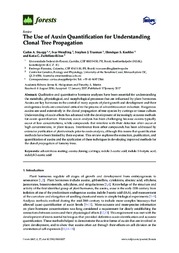The use of auxin quantification for understanding clonal tree propagation.
The use of auxin quantification for understanding clonal tree propagation.
Author(s): STUEPP, C. A.; WENDLING, I.; TRUEMAN, S. J.; KOEHLER, H. S.; ZUFFELLATO-RIBAS, K. C.
Summary: Qualitative and quantitative hormone analyses have been essential for understanding the metabolic, physiological, and morphological processes that are influenced by plant hormones. Auxins are key hormones in the control of many aspects of plant growth and development and their endogenous levels are considered critical in the process of adventitious root induction. Exogenous auxins are used extensively in the clonal propagation of tree species by cuttings or tissue culture. Understanding of auxin effects has advanced with the development of increasingly accurate methods for auxin quantification. However, auxin analysis has been challenging because auxins typically occur at low concentrations, while compounds that interfere with their detection often occur at high concentrations, in plant tissues. Interference from other compounds has been addressed by extensive purification of plant extracts prior to auxin analysis, although this means that quantification methods have been limited by their expense. This review explores the extraction, purification, and quantification of auxins and the application of these techniques in developing improved methods for the clonal propagation of forestry trees.
Publication year: 2017
Types of publication: Journal article
Unit: Embrapa Forestry
Observation
Some of Embrapa's publications are published as ePub files. To read them, use or download one of the following free software options to your computer or mobile device. Android: Google Play Books; IOS: iBooks; Windows and Linux: Calibre.
Access other publications
Access the Agricultural Research Database (BDPA) to consult Embrapa's full library collection and records.
Visit Embrapa Bookstore to purchase books and other publications sold by Embrapa.

